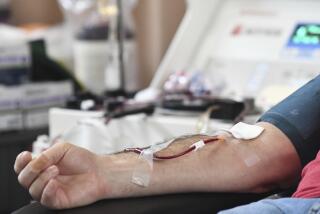New Diabetes Guidelines Urge Testing All Adults From Age 45
- Share via
BOSTON — New federally endorsed guidelines recommend for the first time that all adults be tested for diabetes by age 45 to try to catch the disease before it begins its insidious destruction.
The guidelines, written by an international panel of experts, also lower the cutoff for declaring people diabetic.
The National Institutes of Health, which endorsed the recommendations, estimates that they could help identify 2 million of the 8 million Americans who have diabetes but don’t know it.
The aim is to get these people started on diets, exercise programs and possibly drug treatment before the disease starts a cascade of complications that eventually damage the eyes, heart, kidneys and nerves.
The guidelines were released Monday at a meeting of the American Diabetes Assn., which sponsored them.
Currently, there is no across-the-board recommendation for screening people for diabetes. Instead, doctors test patients when they have some reason to suspect they may be diabetic. Symptoms can include excessive thirst, frequent urination and weight loss.
About 16 million Americans have diabetes, but only about half of them have been diagnosed with the disease. With the new guidelines, “I think we will begin to get into the missing 8 million,” said Dr. Frank Vinicor of the Centers for Disease Control and Prevention in Atlanta.
Among the new guidelines:
* Every adult should have a diabetes test every three years starting at age 45. Those who get a high reading should have the test repeated on another day.
* The cutoff for declaring someone diabetic should be lowered from the current 140 milligrams of glucose per deciliter of blood plasma to 126 milligrams.
* Contrary to earlier recommendations, pregnant women do not need to be tested routinely if they are white, younger than age 25 of normal size and have no close family members with the disease.
More to Read
Sign up for Essential California
The most important California stories and recommendations in your inbox every morning.
You may occasionally receive promotional content from the Los Angeles Times.










